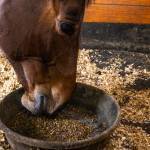Question
Lollipop is my 31-year-old school horse. He’s a 14.2-hand (147-cm) Quarter Horse, and I’d guess his weight at 1,000 lb (450 kg). He’s used for beginner lessons four times a week. Right now he’s in moderate body condition, a score of 5, but I’d like to see him a bit heavier. He spends half the day in his stall, the other half in a paddock. He’s fed 6-9 lb (2.7-4.1 kg) of pelleted feed, beet pulp drizzled with soy oil, and as much second-cut grass hay as he wants each day. Not only is his weight stagnant but he has consistently loose stool. What else can I try?
Answer
Does Lollipop have any dental issues that may not allow him to chew and utilize long-stem hay? It is important for older horses that can’t chew long-stem hay to be offered forage alternatives such as hay cubes, hay pellets, or soaked beet pulp. These alternative forage sources are often higher in digestible energy, or calories, and that makes them especially useful for weight gain. Can soaked alfalfa cubes also be offered in place of some hay? Depending on how much beet pulp Lollipop is currently getting, you may be able to nudge up that fiber source as well.
I assume you have consulted with your veterinarian to rule out any underlying medical conditions that could be causing chronic digestive upset. However, older horses may be at greater risk of developing digestive upset due to age-related changes. A digestive supplement I suggest trying with Lollipop is EquiShure. EquiShure is a time-released hindgut buffer, initially formulated to combat hindgut acidosis, which is frequently used in cases of idiopathic digestive upset when loose manure is present. EquiShure is a protected form of sodium bicarbonate that reaches the hindgut to neutralize excess acid to maintain a more neutral environment. Stabilizing the environment in the hindgut can support and balance the microbial population.
I recommend adding EquiShure to Lollipop’s diet for 20-30 days. I would expect you to notice positive effects of supplementation; however, the extent of improvement varies with each horse and several months of supplementation may be needed to truly evaluate the product’s suitability for your gelding.








